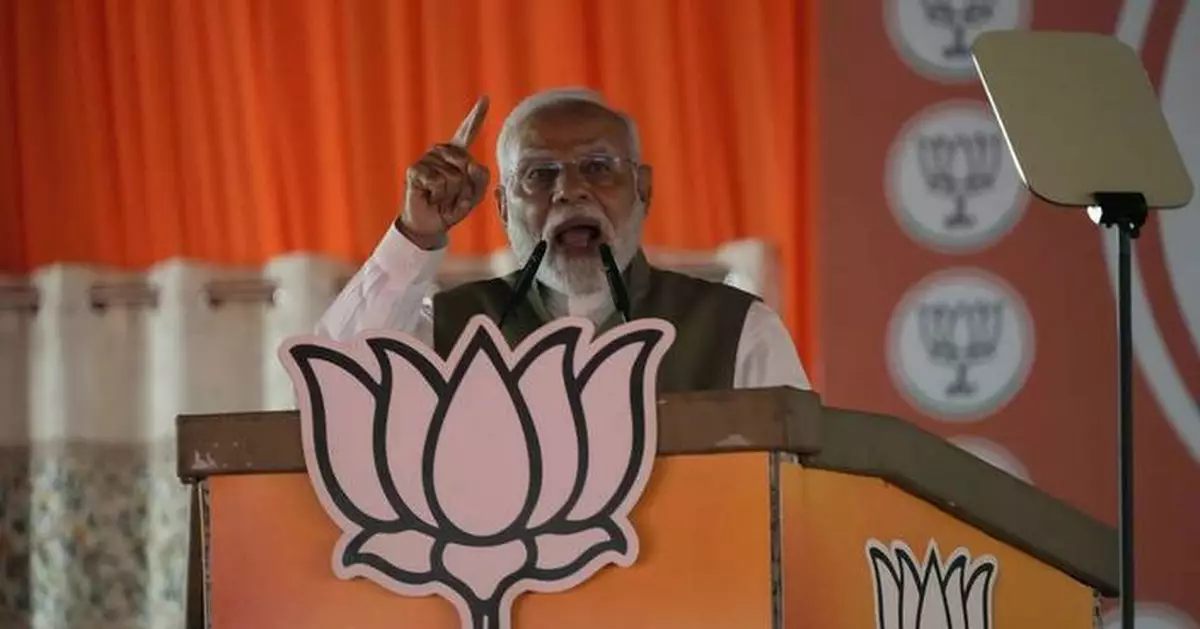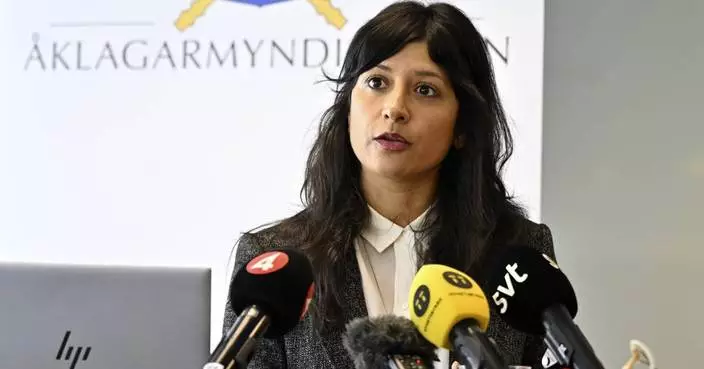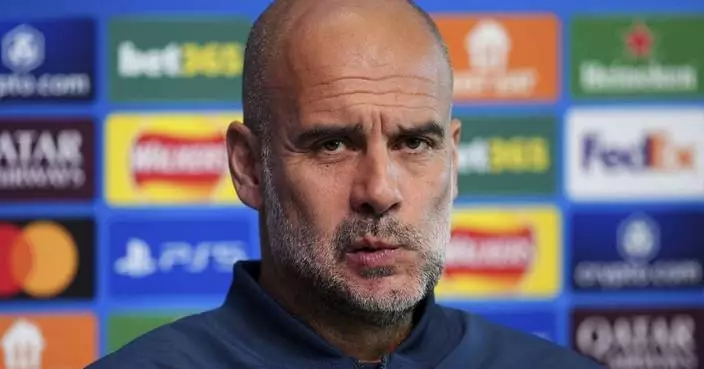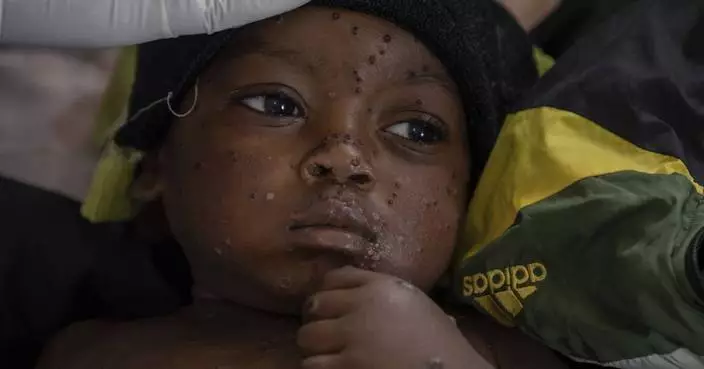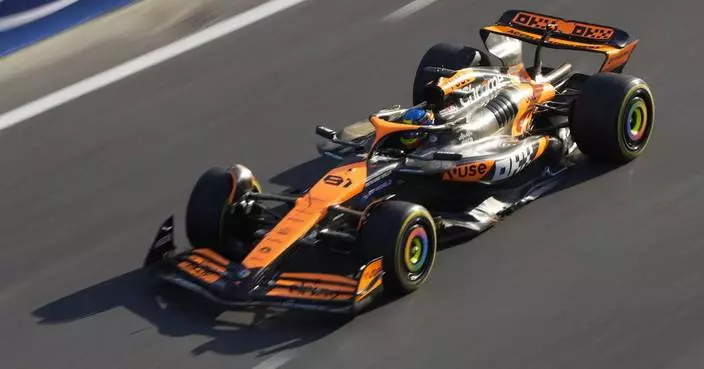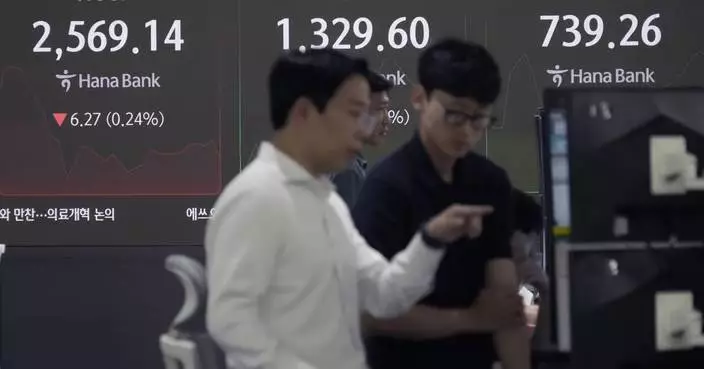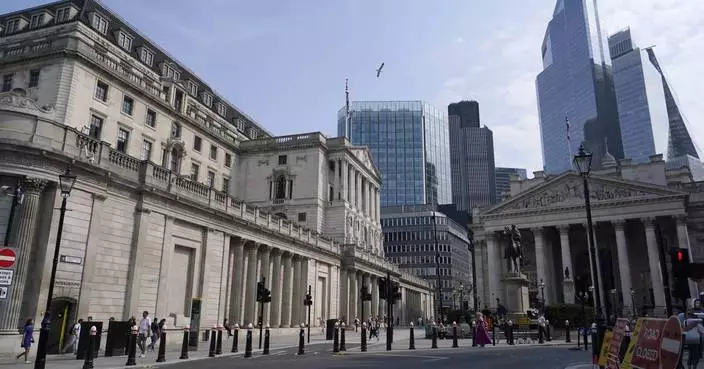SRINAGAR, India (AP) — India’s Prime Minister Narendra Modi visited the main city in Himalayan Kashmir on Thursday to campaign for his party in the local election, the first such vote since New Delhi stripped the disputed region’s semi-autonomy in 2019.
Modi’s visit to Srinagar city in the Kashmir Valley — the heartland of decades of anti-India rebellion — comes amid strong public opposition there to New Delhi’s changes five years back. That move revoked the region’s semi-autonomous status, annulled its separate constitution, downgraded and split the former state into two centrally governed union territories— Ladakh and Jammu-Kashmir — and removed inherited protections on land and jobs.
Click to Gallery
SRINAGAR, India (AP) — India’s Prime Minister Narendra Modi visited the main city in Himalayan Kashmir on Thursday to campaign for his party in the local election, the first such vote since New Delhi stripped the disputed region’s semi-autonomy in 2019.
An Indian paramilitary soldier guards at a closed road ahead of Indian Prime Minister Narendra Modi's visit in Srinagar, Indian controlled Kashmir Thursday, Sept. 19, 2024. (AP Photo/Mukhtar Khan)
Indian paramilitary soldiers and a policeman guard at a closed road ahead of Indian Prime Minister Narendra Modi's visit in Srinagar, Indian controlled Kashmir Thursday, Sept. 19, 2024. (AP Photo/Mukhtar Khan)
Indian paramilitary soldiers guard at a closed road ahead of Indian Prime Minister Narendra Modi's visit in Srinagar, Indian controlled Kashmir Thursday, Sept. 19, 2024. (AP Photo/Mukhtar Khan)
Indian paramilitary soldiers guard at a closed road ahead of Indian Prime Minister Narendra Modi's visit in Srinagar, Indian controlled Kashmir Thursday, Sept. 19, 2024. (AP Photo/Mukhtar Khan)
Supporters of Indian Prime Minister Narendra Modi attend an election rally in Srinagar, Indian controlled Kashmir, Thursday, Sept. 19, 2024. (AP Photo/Mukhtar Khan)
Indian Prime Minister Narendra Modi waves towards the crowd as he arrives to address the election rally in Srinagar, Indian controlled Kashmir, Thursday, Sept. 19, 2024. (AP Photo/Mukhtar Khan)
Policemen and supporters of Indian Prime Minister Narendra Modi leave the venue after an election rally in Srinagar, Indian controlled Kashmir, Thursday, Sept. 19, 2024. (AP Photo/Mukhtar Khan)
Supporters of Indian Prime Minister Narendra Modi listen his speech during an election rally in Srinagar, Indian controlled Kashmir,Thursday, Sept. 19, 2024. (AP Photo/Mukhtar Khan)
Supporters of Indian Prime Minister Narendra Modi attend an election rally in Srinagar, Indian controlled Kashmir,Thursday, Sept.19, 2024. (AP Photo/Mukhtar Khan)
Policemen and supporters of Indian Prime Minister Narendra Modi leave the venue after an election rally in Srinagar, Indian controlled Kashmir, Thursday, Sept. 19, 2024. (AP Photo/Mukhtar Khan)
Indian Prime Minister Narendra Modi addresses an election rally in Srinagar, Indian controlled Kashmir, Thursday, Sept. 19, 2024. (AP Photo/Mukhtar Khan)
Supporters of Indian Prime Minister Narendra Modi shout slogans as he arrives to address an election rally in Srinagar, Indian controlled Kashmir, Thursday, Sept. 19, 2024. (AP Photo/Mukhtar Khan)
Indian Prime Minister Narendra Modi addresses an election rally in Srinagar, Indian controlled Kashmir, Thursday, Sept. 19, 2024. (AP Photo/Mukhtar Khan)
The region has since remained on edge with civil liberties curbed and media freedoms gagged.
Authorities laid razor wires and erected road checkpoints to close the roads leading to the venue of Modi’s election rally in Srinagar’s main commercial center. Armed paramilitary troops and police in flak jackets patrolled the area, snipers and sharpshooters were positioned atop buildings near the venue.
The multistage election will allow Kashmir to have its own truncated government and a local legislature, called an assembly, instead of remaining under New Delhi’s direct rule.
However, there will be a limited transition of power from New Delhi to the local assembly as Kashmir will continue to be a “Union Territory” — directly controlled by the federal government — with India’s Parliament remaining its main legislator. Kashmir’s statehood must be restored for the new government to have powers similar to other states of India.
“We have said in the parliament that we will restore (the region’s) statehood. Only BJP will fulfill this commitment,” Modi said to a cheering crowd at the rally while referring to his Bharatiya Janata Party, without specifying any timeline for the return of statehood.
He called the ongoing election the festival of democracy in the region. “Jammu and Kashmir is strengthening the democracy of India and I congratulate the people for this,” he said.
Kashmir has been at the heart of a conflict between India and Pakistan after British rule of the subcontinent ended in 1947 with the creation of the two rival countries. Both administer part of it but claim the territory in its entirety.
Militants in the Indian-controlled portion of Kashmir have been fighting New Delhi’s rule since 1989. Many Muslim Kashmiris support the rebels’ goal of uniting the territory, either under Pakistani rule or as an independent country.
India insists the insurgency is Pakistan-sponsored terrorism, a charge Islamabad denies. Tens of thousands of people have been killed in the fighting, which many Kashmiri Muslims consider a legitimate freedom struggle.
Kashmir has remained an important part of a muscular rhetoric by Modi and his party colleagues in their outreach to the Hindu support base in India where few issues reach as broad a consensus as that the region must remain a part of the country at any cost.
Modi’s government has repeatedly said the changes would spur investment, bring more development and root out separatism in Kashmir. But critics and many Kashmiris fear this could dilute the region’s demographics.
“It seemed odd to claim that this place is celebrating democracy," said Siddiq Wahid, historian and former vice chancellor of a university in Kashmir. "For the past five years, it has been led by an unelected administration unfamiliar with the region’s idiosyncrasies, it has been dismantled as a state, and unspecified executive powers of its Chief Minister and assembly transferred” to New Delhi appointed administrators, he added.
“New Delhi's centralization of power has increased public frustration over political stasis here,” Wahid said.
Thursday’s visit was Modi’s second to the Muslim-majority region to campaign for his party candidates in the ongoing election. Voting began on Wednesday, with a brisk turnout in the first phase.
The vote is the first in a decade, and the first since his Hindu nationalist government’s 2019 move. Kashmir’s pro-India political parties have promised to fight to undo those changes.
Last week, Modi addressed a similar rally in southern Doda district.
The second and third phases of the polling are scheduled for Sept. 25 and Oct. 1. The process is staggered for logistical reasons and to allow troops to move around to stop potential violence in the Himalayan region. Votes will be counted on Oct. 8, with results expected that day.
At the rally in Srinagar, Modi launched a scathing attack on India’s main opposition Congress party and the regional parties, the National Conference and the Peoples Democratic Party, calling them “three families” responsible for “destruction” and bringing “nothing but chaos and fear” to the region.
“I am sincerely working towards restoring peace here,” he said.
India’s ruling BJP has a strong political base in the region’s Hindu-dominated areas of Jammu that largely favor the 2019 changes and has won multiple seats from there in the past elections. But it is weak in the Kashmir Valley where the BJP has never won a seat.
The party has fielded only 19 candidates for the 47 seats in the valley while it is contesting all 43 seats in Jammu.
Modi’s party is not officially aligned with any local group, but many politicians believe it is tacitly supporting some parties and independent candidates in the Kashmir Valley who privately agree with it.
The region’s main pro-India political parties accused the BJP of trying to manipulate the election and fragment the valley’s vote through independents. About 43% of 503 candidates contesting in the Kashmir Valley are independents, in contrast to 35% in Jammu.
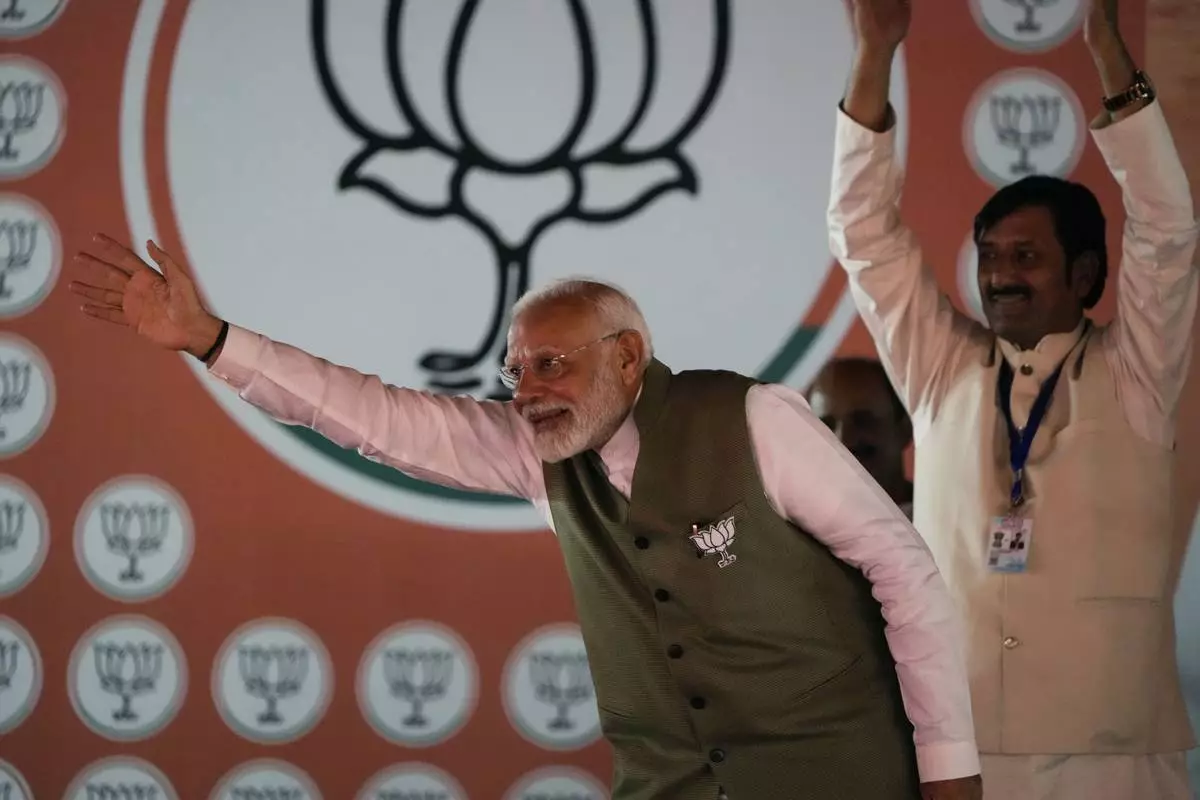
Indian Prime Minister Narendra Modi waves towards the crowd as he arrives to address the election rally in Srinagar, Indian controlled Kashmir, Thursday, Sept. 19, 2024. (AP Photo/Mukhtar Khan)
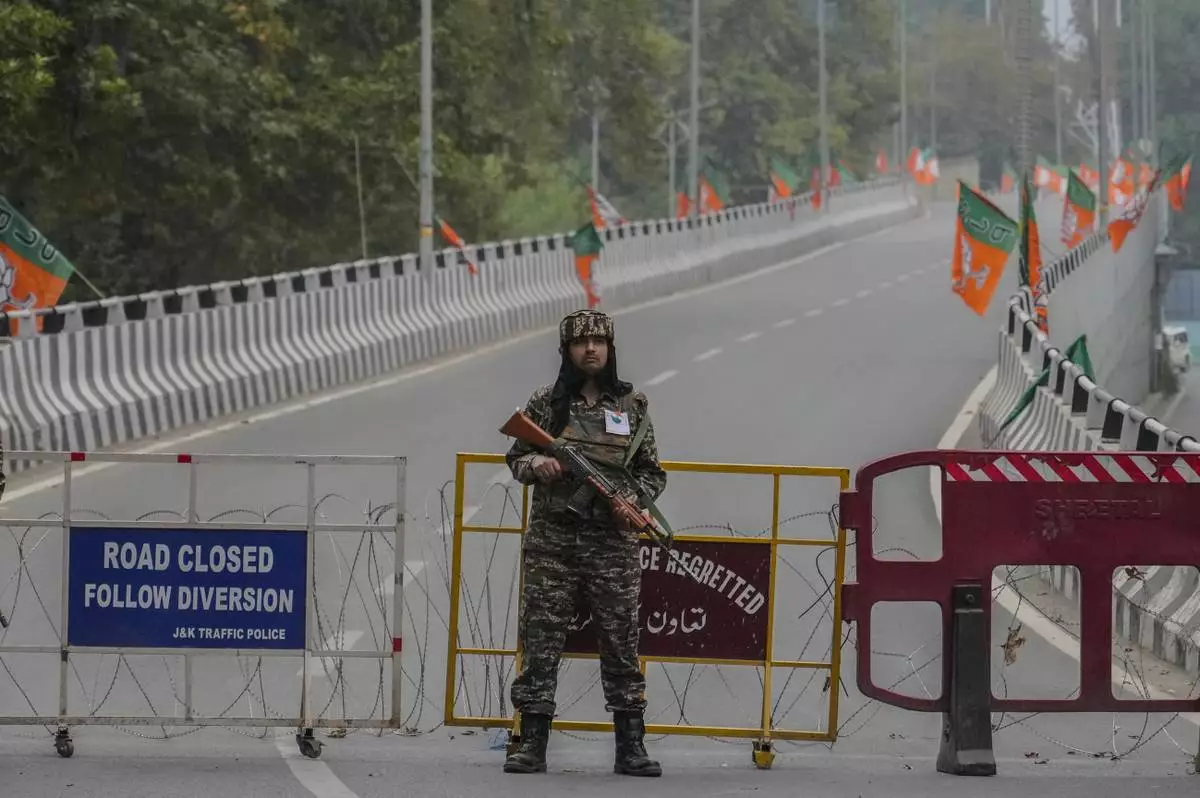
An Indian paramilitary soldier guards at a closed road ahead of Indian Prime Minister Narendra Modi's visit in Srinagar, Indian controlled Kashmir Thursday, Sept. 19, 2024. (AP Photo/Mukhtar Khan)
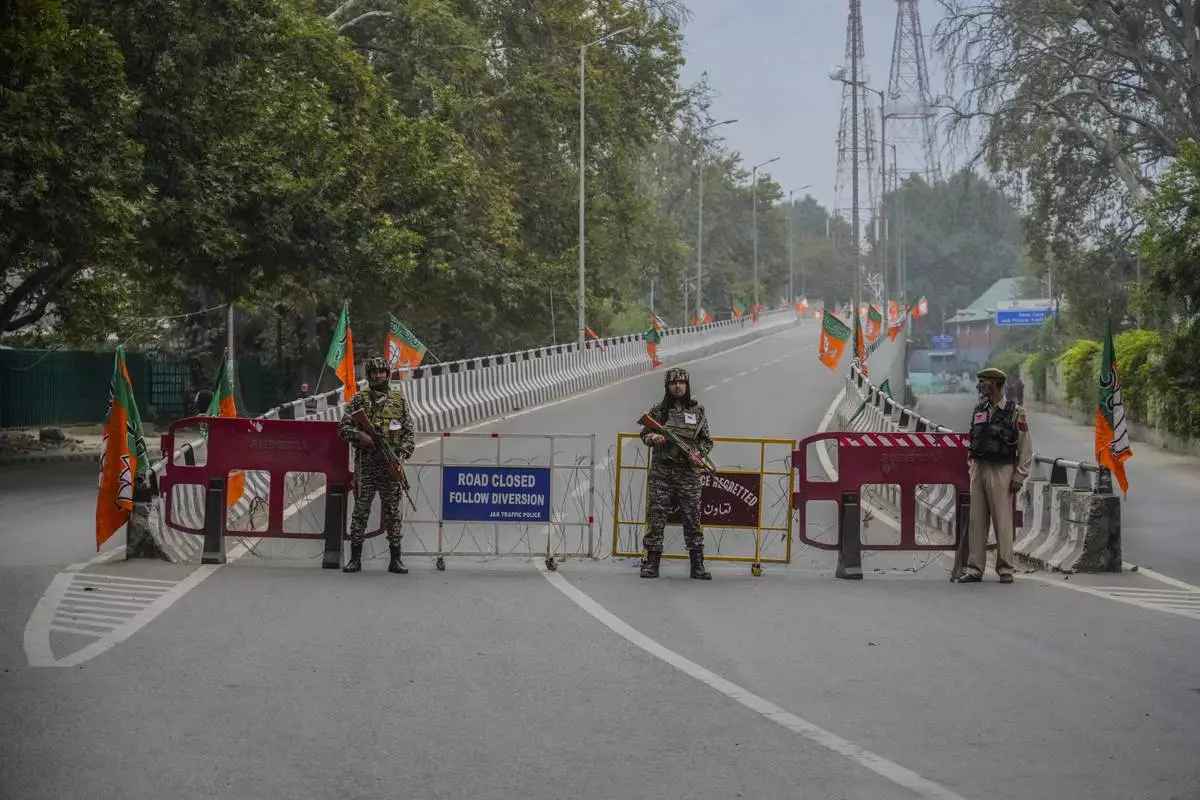
Indian paramilitary soldiers and a policeman guard at a closed road ahead of Indian Prime Minister Narendra Modi's visit in Srinagar, Indian controlled Kashmir Thursday, Sept. 19, 2024. (AP Photo/Mukhtar Khan)
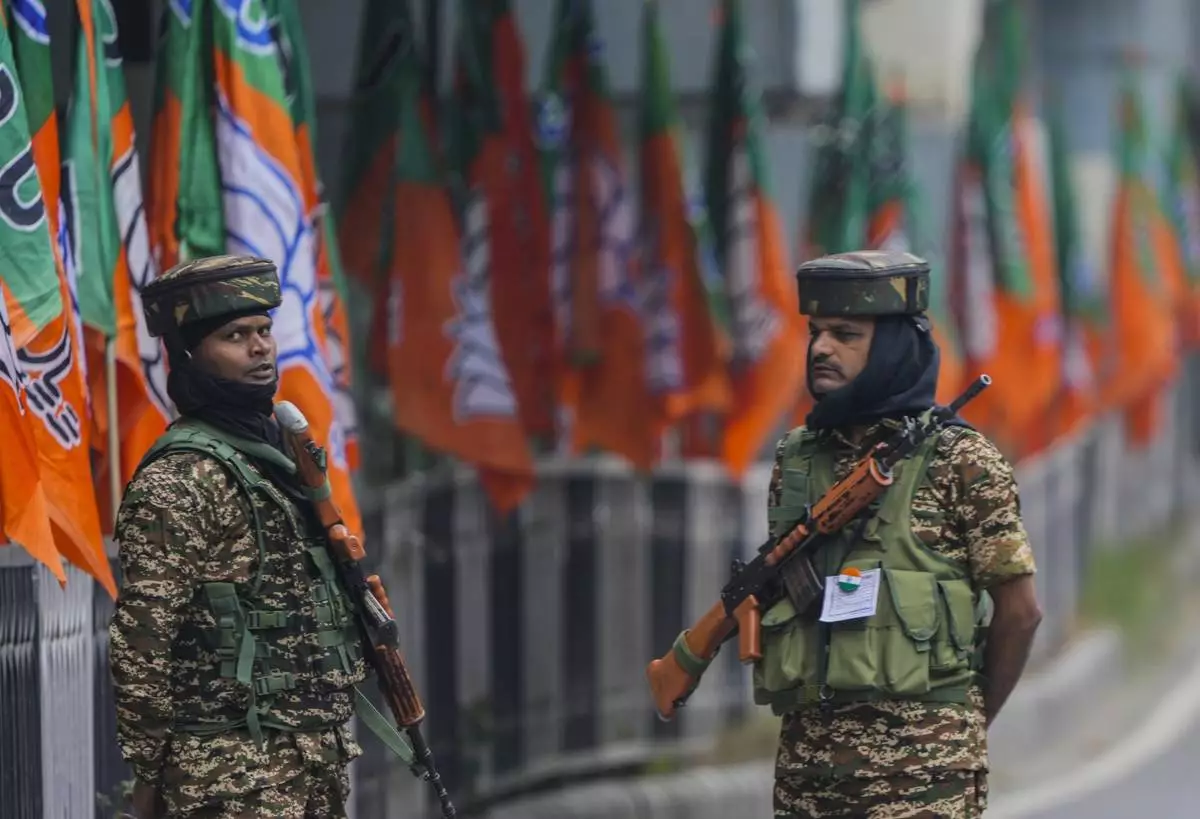
Indian paramilitary soldiers guard at a closed road ahead of Indian Prime Minister Narendra Modi's visit in Srinagar, Indian controlled Kashmir Thursday, Sept. 19, 2024. (AP Photo/Mukhtar Khan)
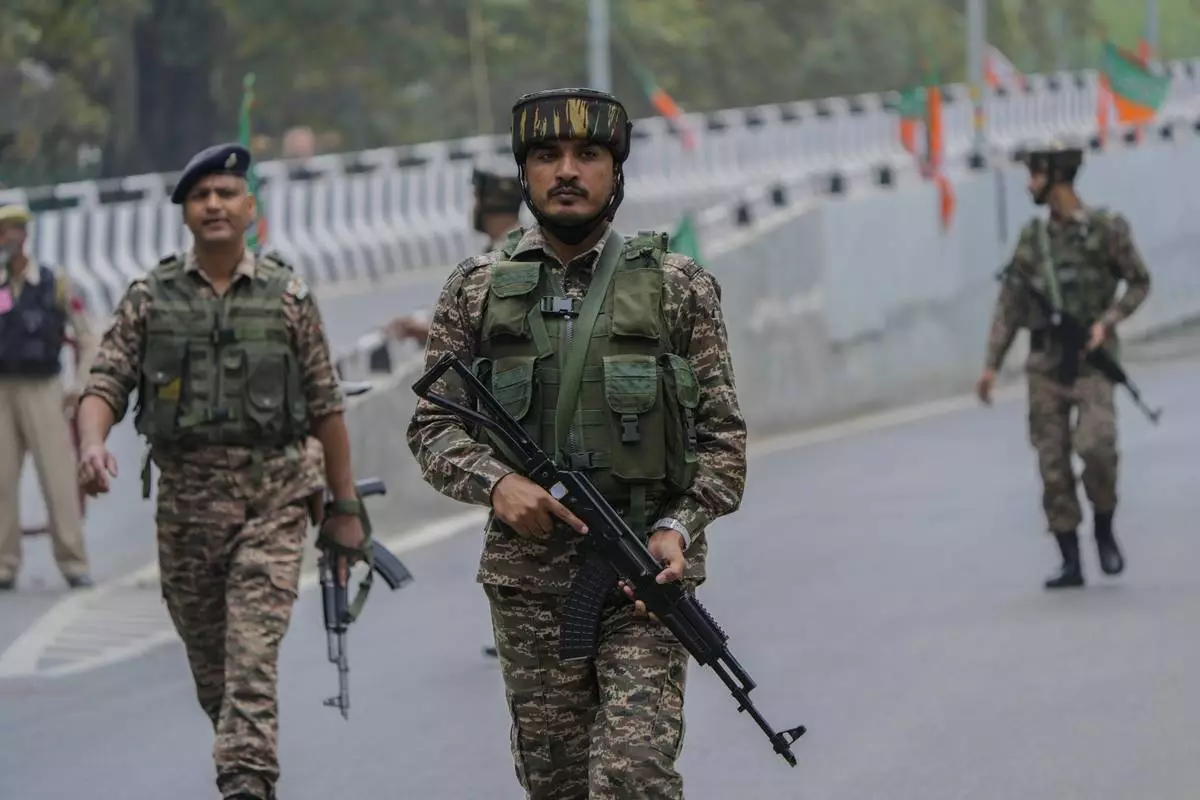
Indian paramilitary soldiers guard at a closed road ahead of Indian Prime Minister Narendra Modi's visit in Srinagar, Indian controlled Kashmir Thursday, Sept. 19, 2024. (AP Photo/Mukhtar Khan)
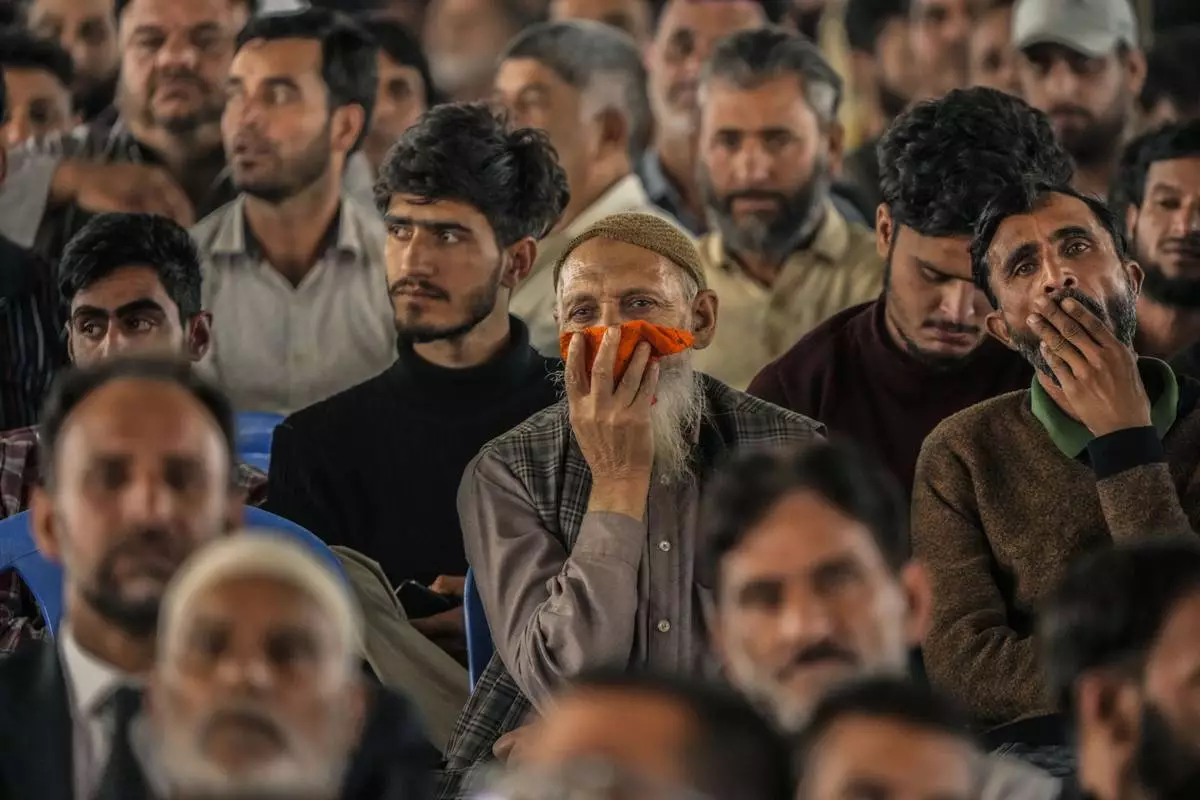
Supporters of Indian Prime Minister Narendra Modi attend an election rally in Srinagar, Indian controlled Kashmir, Thursday, Sept. 19, 2024. (AP Photo/Mukhtar Khan)
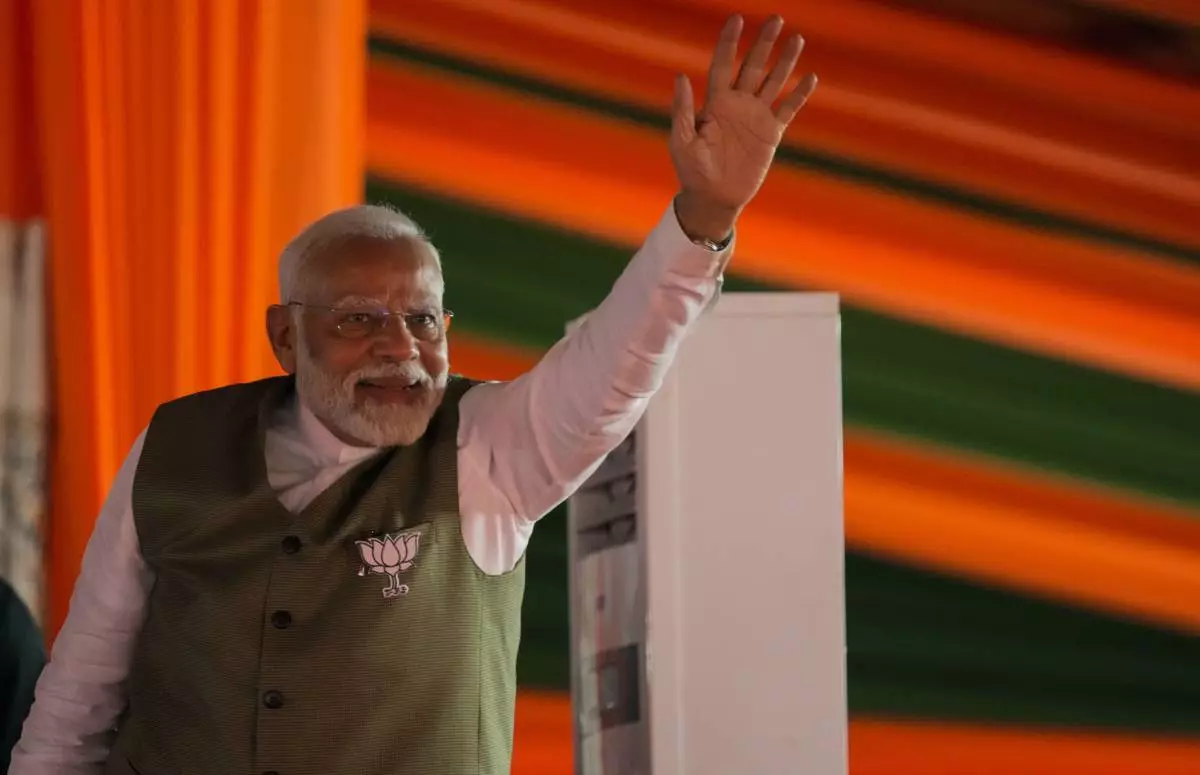
Indian Prime Minister Narendra Modi waves towards the crowd as he arrives to address the election rally in Srinagar, Indian controlled Kashmir, Thursday, Sept. 19, 2024. (AP Photo/Mukhtar Khan)
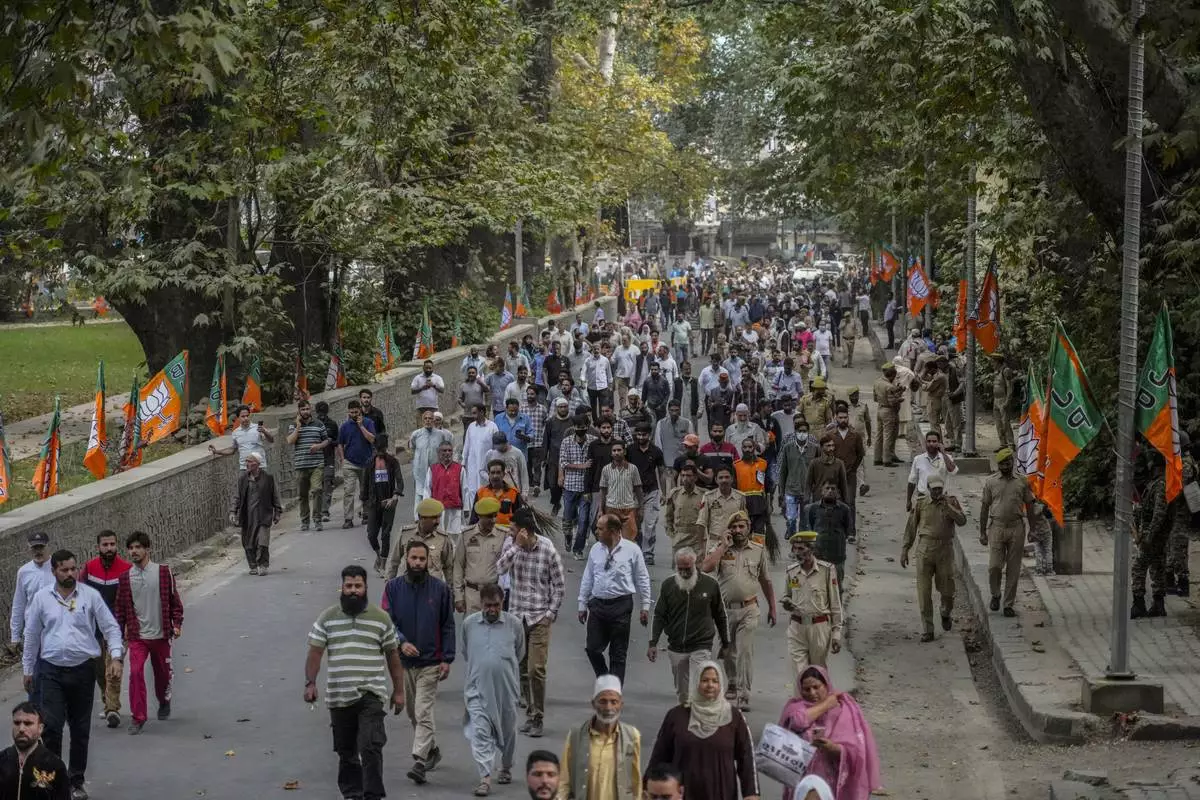
Policemen and supporters of Indian Prime Minister Narendra Modi leave the venue after an election rally in Srinagar, Indian controlled Kashmir, Thursday, Sept. 19, 2024. (AP Photo/Mukhtar Khan)
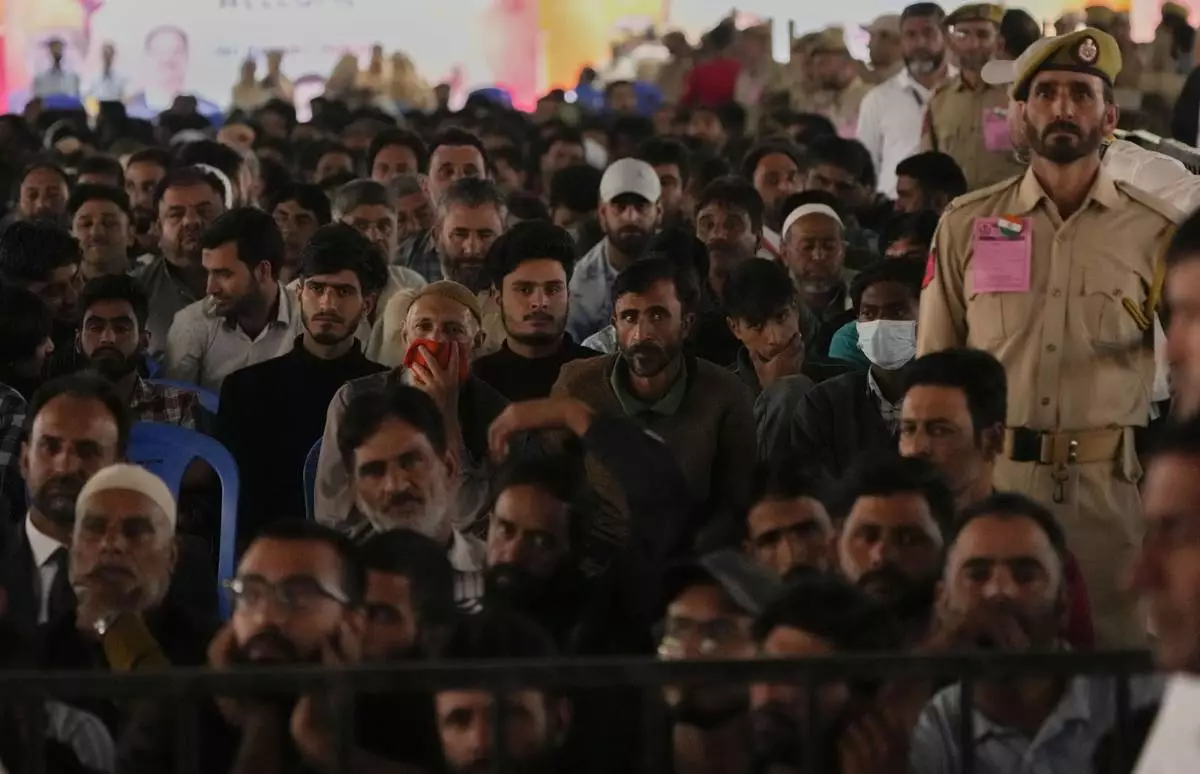
Supporters of Indian Prime Minister Narendra Modi listen his speech during an election rally in Srinagar, Indian controlled Kashmir,Thursday, Sept. 19, 2024. (AP Photo/Mukhtar Khan)
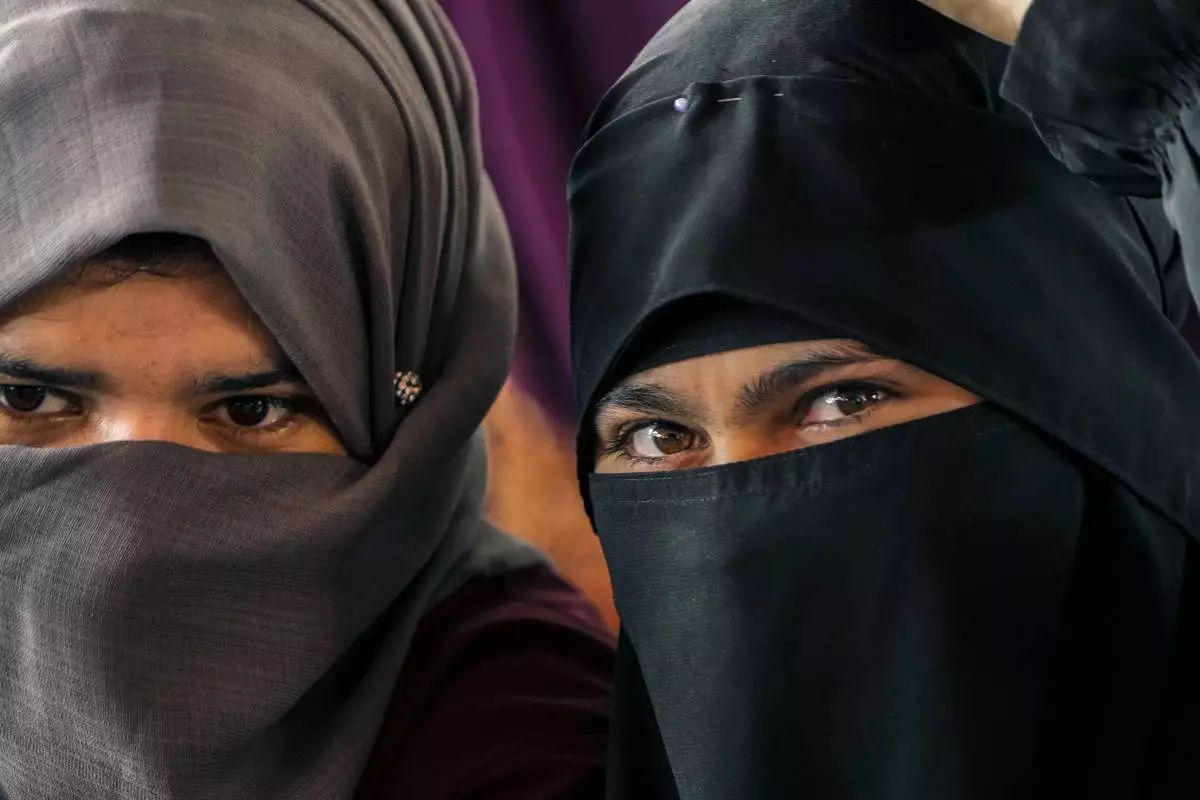
Supporters of Indian Prime Minister Narendra Modi attend an election rally in Srinagar, Indian controlled Kashmir,Thursday, Sept.19, 2024. (AP Photo/Mukhtar Khan)
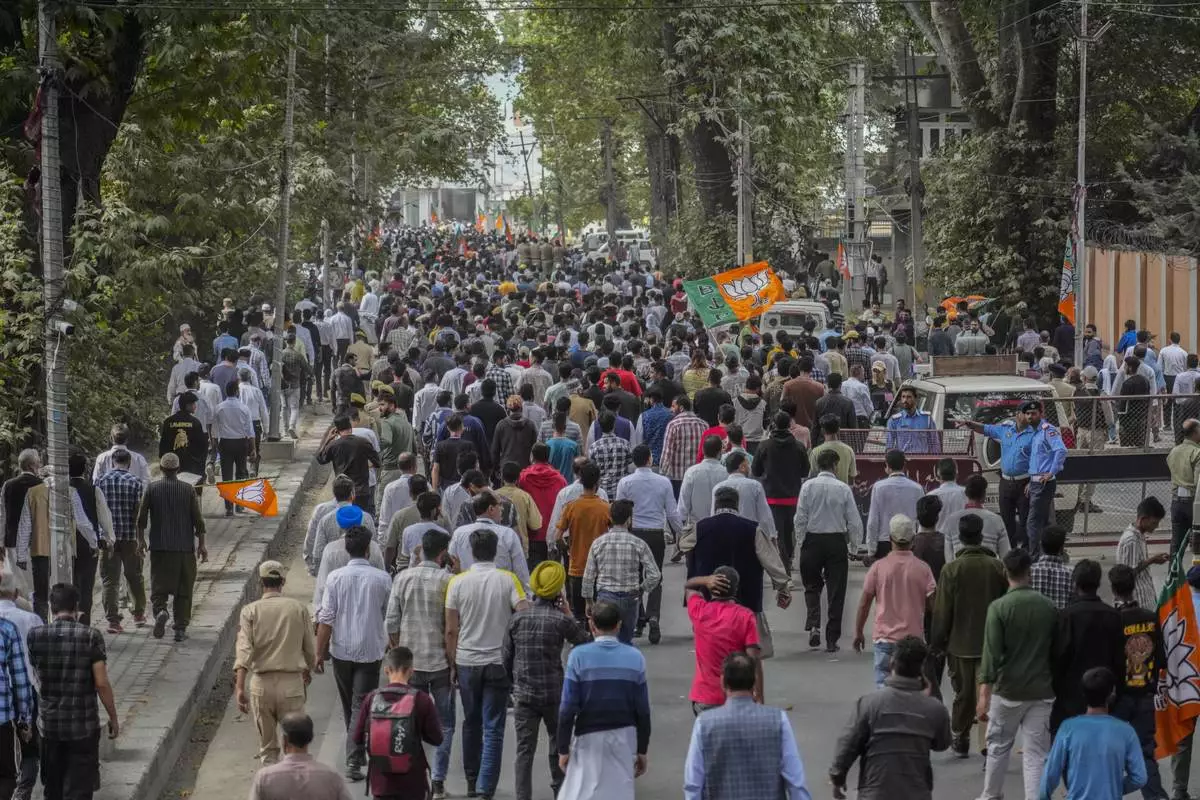
Policemen and supporters of Indian Prime Minister Narendra Modi leave the venue after an election rally in Srinagar, Indian controlled Kashmir, Thursday, Sept. 19, 2024. (AP Photo/Mukhtar Khan)
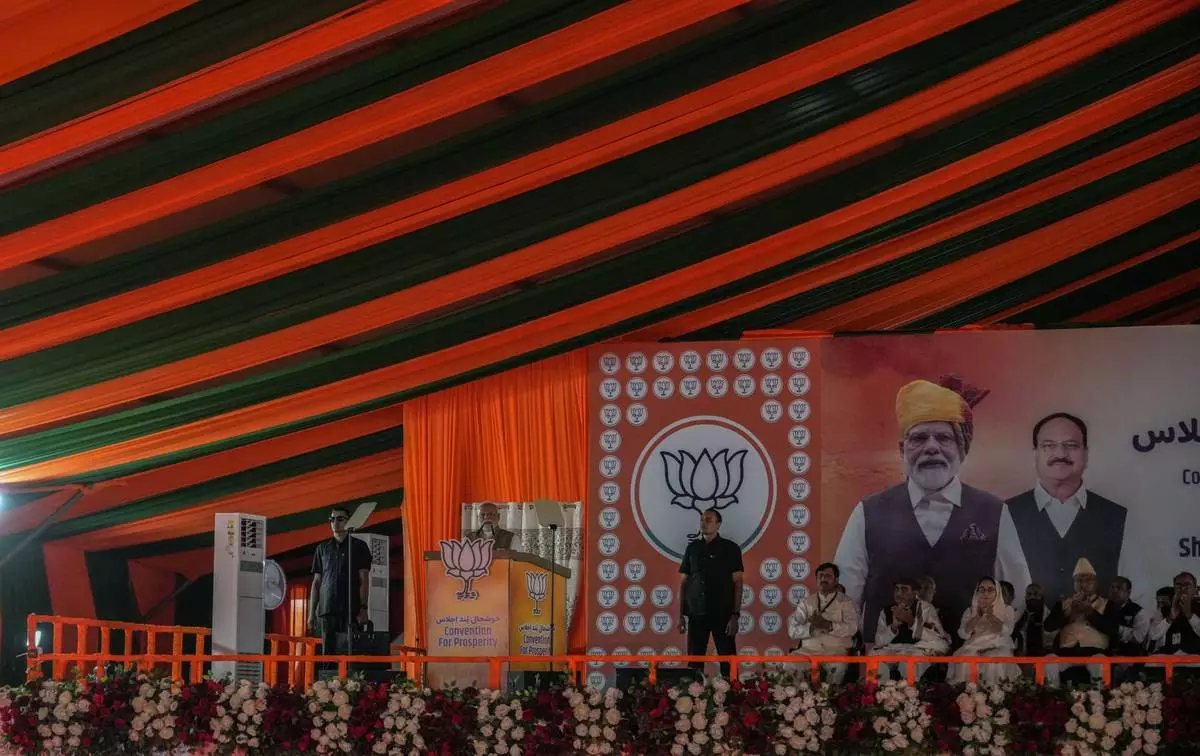
Indian Prime Minister Narendra Modi addresses an election rally in Srinagar, Indian controlled Kashmir, Thursday, Sept. 19, 2024. (AP Photo/Mukhtar Khan)
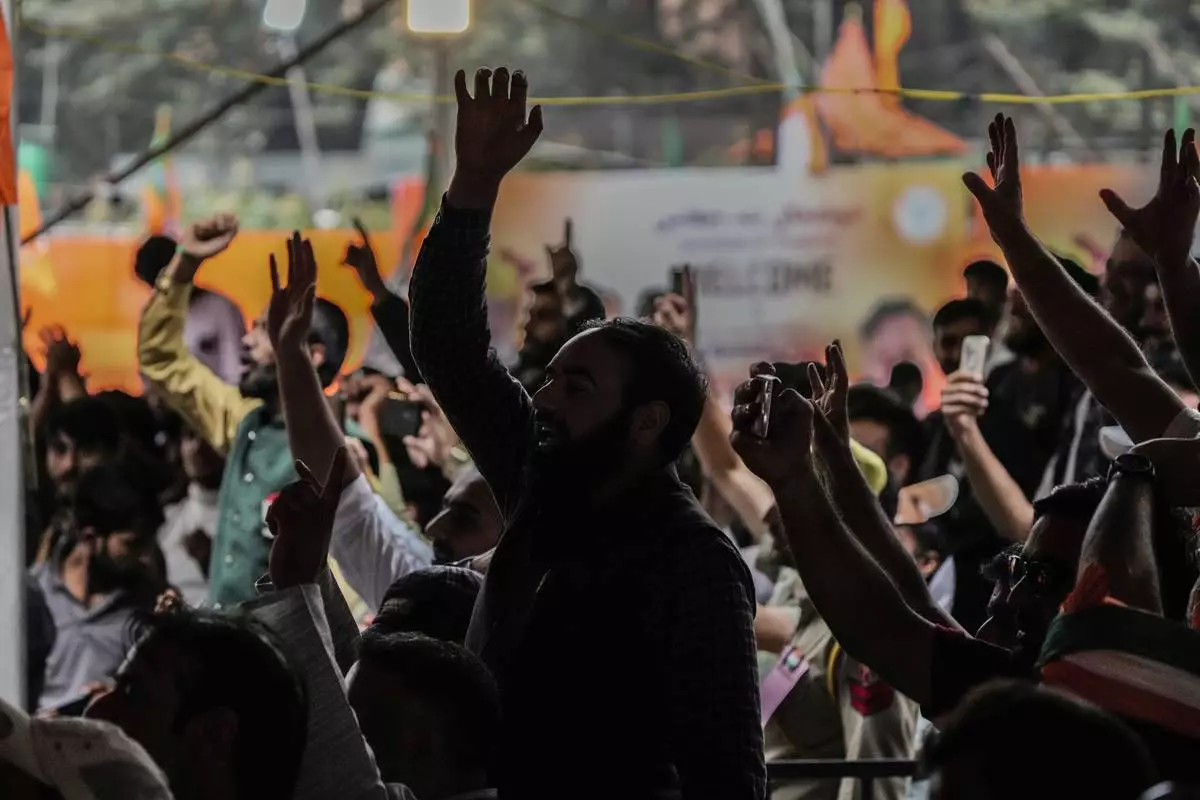
Supporters of Indian Prime Minister Narendra Modi shout slogans as he arrives to address an election rally in Srinagar, Indian controlled Kashmir, Thursday, Sept. 19, 2024. (AP Photo/Mukhtar Khan)
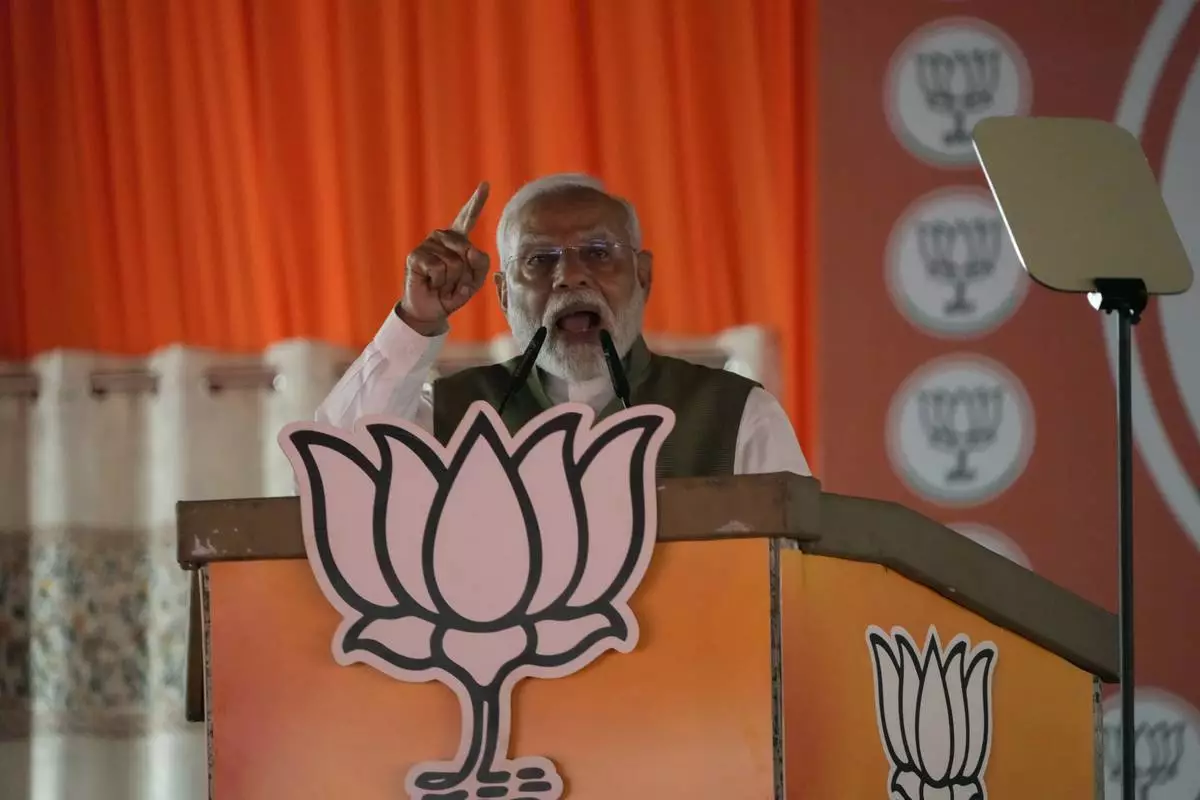
Indian Prime Minister Narendra Modi addresses an election rally in Srinagar, Indian controlled Kashmir, Thursday, Sept. 19, 2024. (AP Photo/Mukhtar Khan)
NEW YORK (AP) — Just one day after pagers used by hundreds of members of the militant group Hezbollah exploded, more electronic devices detonated in Lebanon Wednesday in what appeared to be a second wave of sophisticated, deadly attacks that targeted an extraordinary number of people.
Both attacks, which are widely believed to be carried out by Israel, have hiked fears that the two sides’ simmering conflict could escalate into all-out war. This week's explosions have also deepened concerns about the scope of potentially-compromised devices, particularly after such bombings have killed or injured so many civilians.
Here's what we know so far.
On Tuesday, pagers used by hundreds of Hezbollah members exploded almost simultaneously in parts of Lebanon as well as Syria. The attack killed at least 12 people — including two young children — and wounded thousands more.
An American official, who spoke on the condition of anonymity, said Israel briefed the U.S. on the operation — where small amounts of explosives hidden in the pagers were detonated. The Lebanese government and Iran-backed Hezbollah also blamed Israel for the deadly explosions. The Israeli military, which has a long history of sophisticated operations behind enemy lines, declined to comment.
A day after these deadly explosions, more detonations triggered in Beirut and parts of Lebanon Wednesday — including several blasts heard at a funeral in Beirut for three Hezbollah members and a child killed by Tuesday's explosions, according to Associated Press journalists at the scene.
At least 20 people were killed and another 450 were wounded, the Health Ministry said, in this apparent second attack.
When speaking to troops on Wednesday, Israeli Defense Minister Yoav Gallant made no mention of the explosions of electronic devices, but praised the work of Israel's army and security agencies and said “we are at the start of a new phase in the war."
A Hezbollah official told the AP that walkie-talkies used by the group exploded on Wednesday. The official spoke on condition of anonymity because he was not authorized to speak to the media. Lebanon’s official news agency also reported that solar energy systems exploded in homes in several areas of Beirut and in southern Lebanon, wounding at least one girl.
While details are still emerging from Wednesday's attack, the second wave of explosions targeted a country that is still reeling from Tuesday's pager bombings. That attack appeared to be a complex Israeli operation targeting Hezbollah, but an enormous amount of civilian casualties were also reported, as the detonations occurred wherever members' pagers happened to be — including homes, cars, grocery stores and cafes.
Hezbollah has used pagers as a way to communicate for years. And more recently, Hezbollah leader Hassan Nasrallah warned the group’s members not to carry cellphones, saying they could be used by Israel to track the group’s movements.
Pagers also run on a different wireless network than mobile phones, which usually makes them more resilient in times of emergency. And for a group like Hezbollah, the pagers provided a means to sidestep what’s believed to be intensive Israeli electronic surveillance on mobile phone networks in Lebanon — as pagers' tech is simpler and carries lower risks for intercepted communications.
Elijah J. Magnier, a Brussels-based veteran and a senior political risk analyst who says he has had conversations with members of Hezbollah and survivors of the attack, said that the newer brand of pagers used in Tuesday’s explosions were procured more than six months ago. How they arrived in Lebanon remains unclear.
Taiwanese company Gold Apollo said Wednesday it had authorized use of its brand on the AR-924 pager model — but that a Budapest, Hungary-based company called BAC Consulting KFT produced and sold the pagers.
Taiwan’s Ministry of Economic Affairs said that it had no records of direct exports of Gold Apollo pagers to Lebanon. And Hungarian government spokesman later added that the pager devices had never been in Hungary, either, noting that BAC had merely acted as an intermediary.
Speculation around the origins of the devices that exploded Wednesday has also emerged. A sales executive at the U.S. subsidiary of Japanese walkie-talkie maker Icom told the AP that the exploded radio devices in Lebanon appear to be a knock-off product and not made by Icom.
“I can guarantee you they were not our products,” said Ray Novak, a senior sales manager for Icom’s amateur radio division, in an interview Wednesday at a trade show in Providence, Rhode Island.
Novak said Icom introduced the V-82 model more than two decades ago and it has long since been discontinued. It was designed for amateur radio operators and for use in social or emergency communications, including by people tracking tornadoes or hurricanes, he said.
Tuesday's explosions were most likely the result of supply-chain interference, several experts told the AP — noting that very small explosive devices may have been built into the pagers prior to their delivery to Hezbollah, and then all remotely triggered simultaneously, possibly with a radio signal. That corroborates information shared from the U.S. official.
A former British Army bomb disposal officer explained that an explosive device has five main components: A container, a battery, a triggering device, a detonator and an explosive charge.
“A pager has three of those already,” said the ex-officer, who spoke on condition of anonymity because he now works as a consultant with clients on the Middle East. “You would only need to add the detonator and the charge.”
This signals involvement of a state actor, said Sean Moorhouse, a former British Army officer and explosive ordnance disposal expert. He added that Israel’s foreign intelligence agency, the Mossad, was the most obvious suspect to have the resources to carry out such an attack. Israel has a long history of carrying out similar operations in the past.
The specifics of Wednesday's explosions are still uncertain. But reports of more electronic devices exploding may suggest even greater infiltration of boobytrap-like interference in Lebanon’s supply chain. It also deepens concerns around the lack of certainty of who may be holding rigged devices.
It would take a long time to plan an attack of this scale. The exact specifics are still unknown, but experts who spoke with the AP about Tuesday's explosions shared estimates ranging anywhere between several months to two years.
The sophistication of the attack suggests that the culprit has been collecting intelligence for a long time, explained Nicholas Reese, adjunct instructor at the Center for Global Affairs in New York University’s School of Professional Studies. An attack of this caliber requires building the relationships needed to gain physical access to the pagers before they were sold; developing the technology that would be embedded in the devices; and developing sources who can confirm that the targets were carrying the pagers.
Citing conversations with Hezbollah contacts, Magnier said the group is currently investigating what type of explosives were used in the device, suspecting RDX or PETN, highly explosive materials that can cause significant damage with as little as 3-5 grams. They are also questioning whether the device had a GPS system allowing Israel to track movement of the group members.
N.R. Jenzen-Jones, an expert in military arms who is director of the Australian-based Armament Research Services, added that “such a large-scale operation also raises questions of targeting" — stressing the number of causalities and enormous impact reported so far.
“How can the party initiating the explosive be sure that a target’s child, for example, is not playing with the pager at the time it functions?” he said.
Associated Press journalists Johnson Lai in Taipei, Bassem Mroue in Beirut and Matt O'Brien in Providence, Rhode Island contributed to this report.
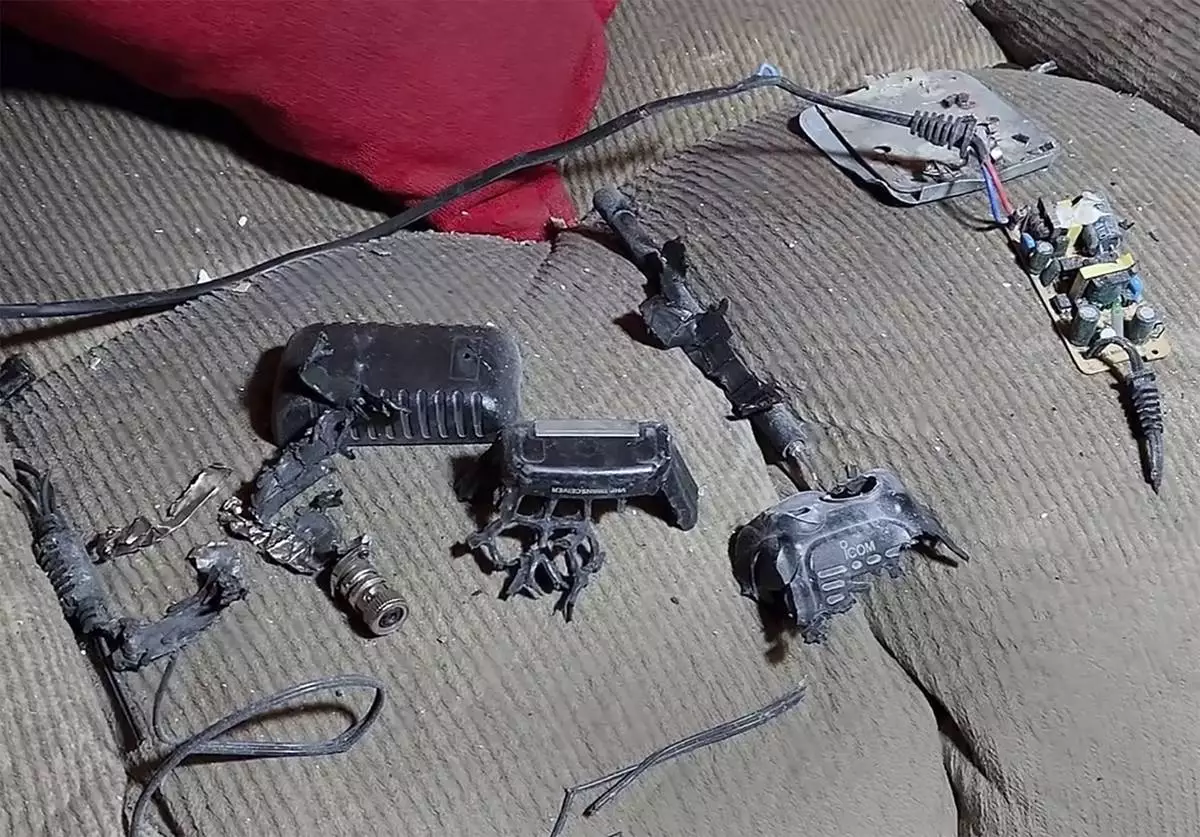
This video grab, shows a walkie-talkie that was exploded inside a house, in Baalbek, east Lebanon, Wednesday, Sept. 18, 2024. (AP Photo)
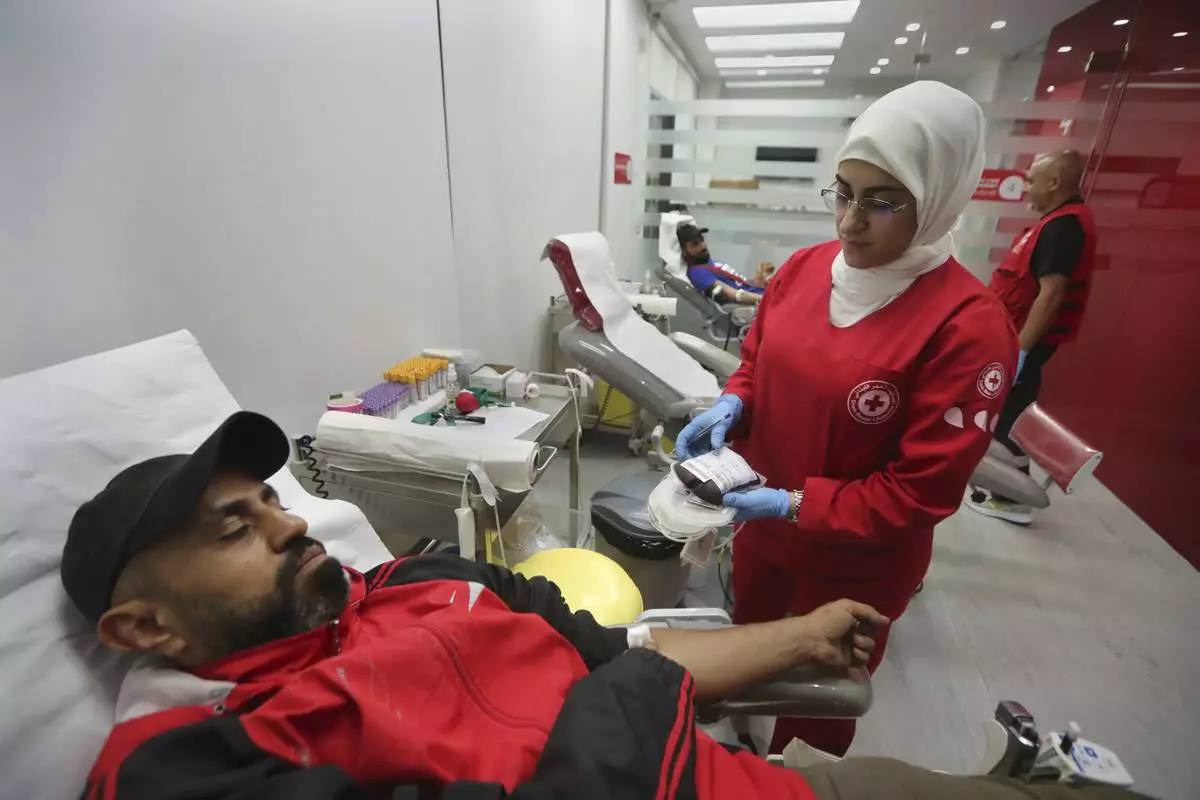
People donate blood for those who were injured by their exploded handheld pagers, at a Red Cross center, in the southern port city of Sidon, Lebanon, Tuesday, Sept. 17, 2024. (AP Photo/Mohammed Zaatari)
















